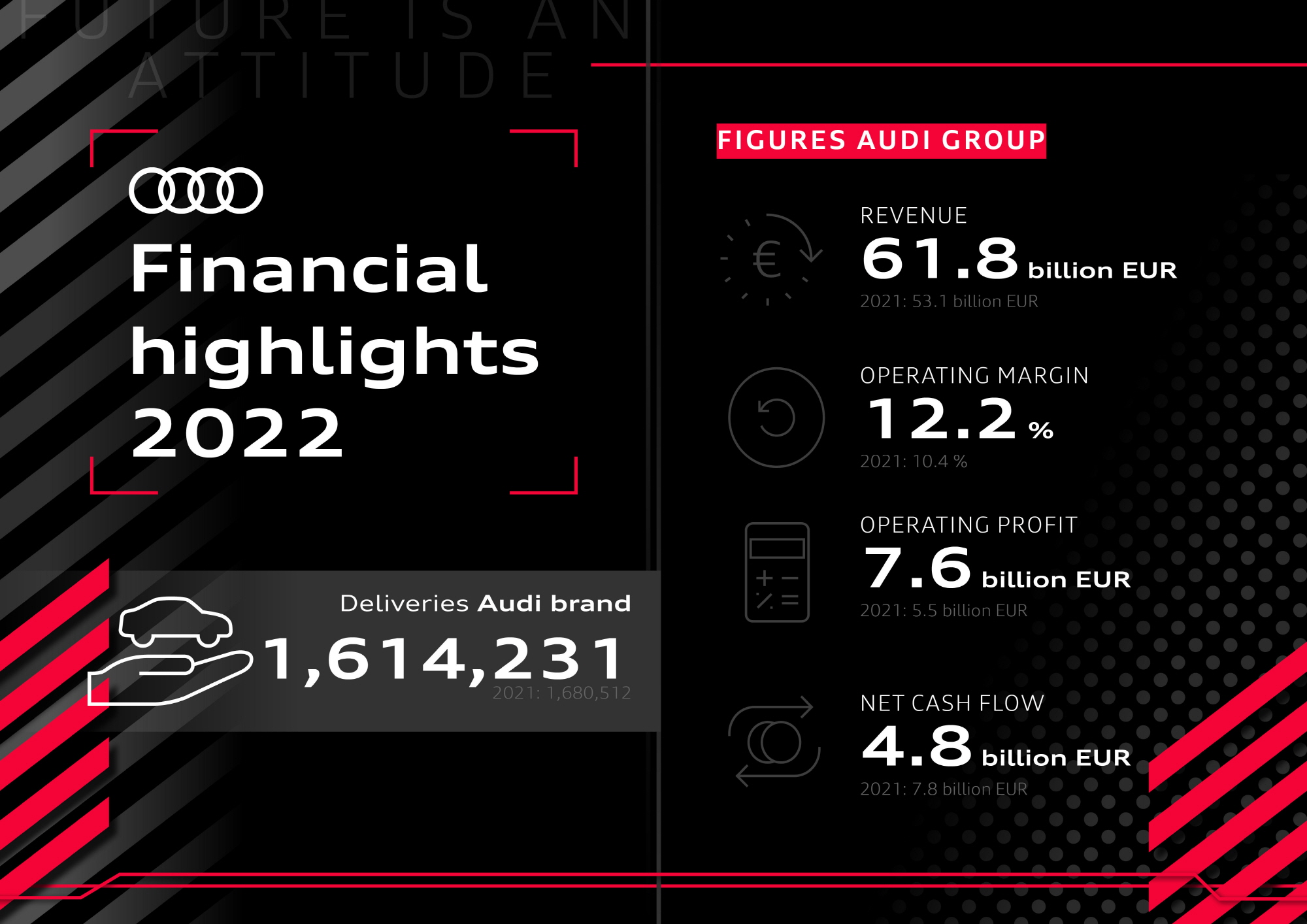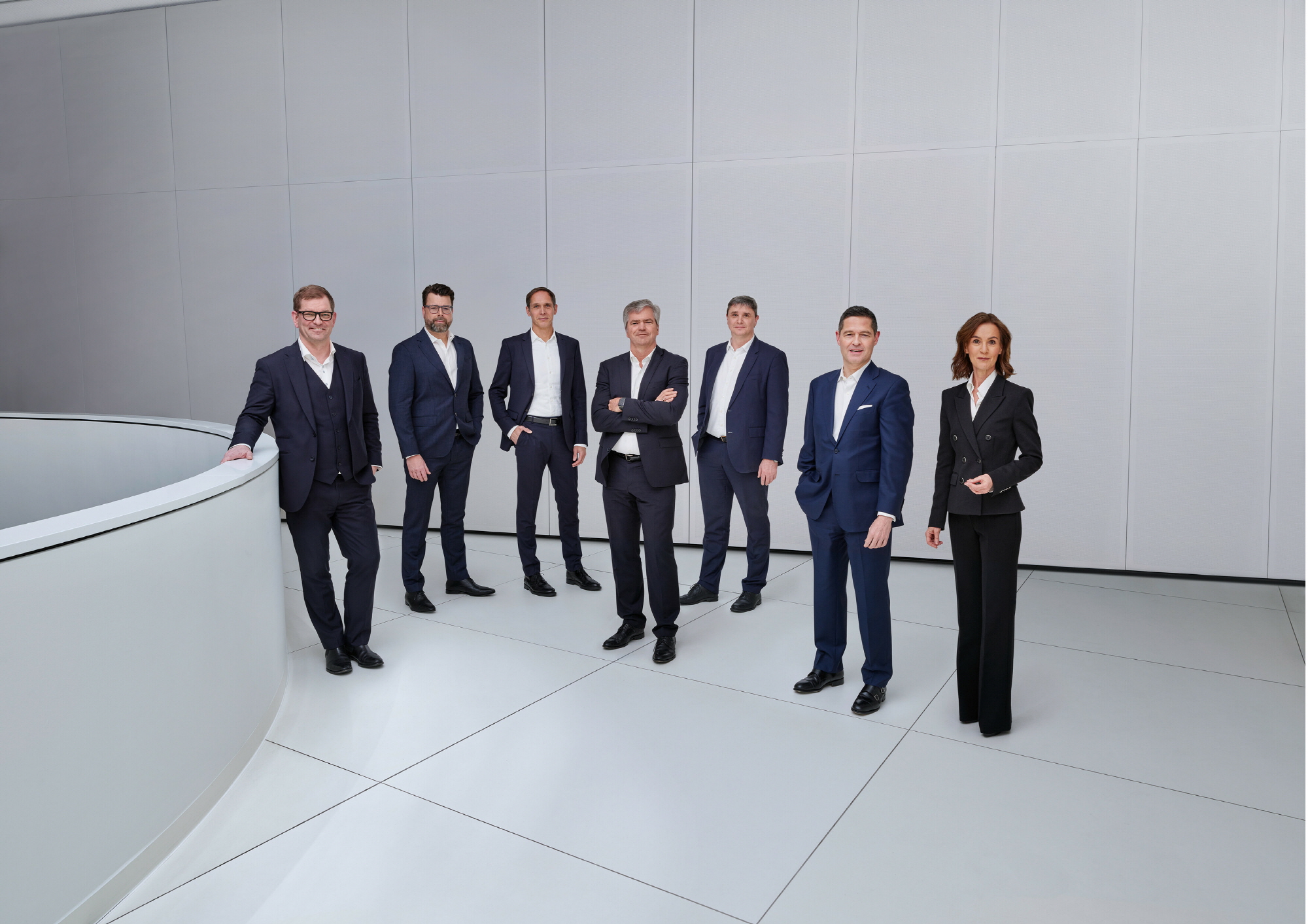
In 2022, the Audi Group continued its efforts to redefine itself as a connected pure electric premium mobility brand, while closing the fiscal year with record achievements.
The group’s revenue rose by 16.4% to €61.8 billion, and operating profit surged by nearly 40% to an all-time high of €7.6 billion. The operating profit margin increased from 10.4% the previous year to 12.2%, while net cash flow reached €4.8 billion, the second highest in the group’s history. Key contributors to the outstanding financial performance in 2022 included crisis management capabilities in the face of global issues, a strong pricing position, and solid performances from brands like Bentley, Lamborghini, and Ducati.
The volume of pure electric vehicle deliveries also saw significant growth in 2022. Audi is set to launch the largest product campaign in the group’s history with the new Q6 e-tron model series starting in 2023. The Q6 e-tron model series will be the first pure electric model to utilize the PPE (Premium Platform Electric).
Marcus Duesmann, CEO of Audi AG, stated, “Our Progress 2030 strategy provides the right answers even in various crisis situations.” He added, “Audi is fully focused on systematically advancing sustainability as well as product digitization and electrification.”
The premium brand group, consisting of Audi, Bentley, Lamborghini, and Ducati, delivered a total of 1,638,638 cars (2021: 1,688,978) and 61,562 (2021: 59,447) motorcycles to customers in 2022. Despite facing significant logistical and supply chain challenges in the first half of the year, the solid performance in the second half allowed the delivery numbers to maintain the previous year’s levels. In 2022, the Audi brand delivered 1,614,231 cars (2021: 1,680,512) to customers.
The number of pure electric model deliveries from the Audi Group notably increased once again in 2022. With a growth of around 44% in pure electric vehicle deliveries (118,196 vehicles), the Audi Group continues to drive its systematic electrification strategy. Due to steady and high demand for electric vehicles, the share of pure electric vehicles in the total deliveries rose from 4.8% the previous year to 7.2%.
With the launch of the PPE (Premium Platform Electric), Audi is solidifying its commitment to becoming a leader in the field of connected pure electric premium mobility. The PPE platform, developed in collaboration with Porsche, is a crucial element in expanding Audi’s electric vehicle lineup. The first production model based on PPE, the Q6 e-tron model series, is set to be revealed in the second half of 2023.
Duesmann emphasized, “With the Audi Q6 e-tron, the era of electric mobility will begin in Ingolstadt.” He shared, “To achieve this, we are building dedicated battery assembly facilities on-site. This will allow us to establish critical know-how right here in Germany and educate future employees on-site.”
In 2022, the Audi Group’s revenue reached €61.75 billion (2021: €53.068 billion), a sharp 16.4% increase driven by a strong pricing position and the impact from Bentley, which joined the group on January 1, 2022. The pure electric Audi Q4 e-tron, Audi e-tron, and Audi e-tron GT quattro models also significantly contributed to high sales, similar to the Audi A3 and Audi Q5 model series.
Since the 2021 fiscal year, the Audi Group has voluntarily reported figures in line with EU classification law. The proportion of revenue reported under EU classification law accounted for 13.5% of total revenue (2021: 12.8%), increasing to €8.3 billion (2021: €6.8 billion).
The 49% increase in profits from pure electric vehicle sales reflects another major milestone in Audi’s electrification roadmap. Audi emphasizes the importance of ESG sustainability criteria in its ‘Progress 2030 strategy.’
To demonstrate its commitment to sustainable development in line with ESG (Environmental, Social, Governance) standards, Audi AG is currently undergoing a comprehensive ESG rating assessment from independent institutions. The results of this assessment are expected to be released in the spring of 2023.
To contribute to a sustainable future, Audi AG is also establishing a vehicle value chain based on a circular economy. Over the next few years, Audi plans to steadily increase the proportion of recycled materials used in vehicles. Additionally, by enhancing direct accessibility to secondary materials, long-term supply stability can be improved. Together with 15 partners from the research, recycling, and supply sectors, Audi initiated a pilot project called ‘MaterialLoop’ in October 2022. Audi and its partners are exploring ways to utilize end-of-life automotive materials in the production of new vehicles, with around 100 decommissioned vehicles already dismantled.
Beyond this project, Audi is engaged in multiple circular economy initiatives. An aluminum closed loop is already being implemented at Audi’s factories in Neckarsulm, Ingolstadt, and Győr, Hungary, along with the Bratislava Volkswagen plant.
The Audi Group is accelerating its efforts to emerge as a sustainable connected premium mobility brand. Between 2023 and 2027, Audi plans to invest approximately €28 billion, accounting for two-thirds of its expenditures, in electrification and digitalization. Duesmann declared, “We will focus on sustainable goals and take short- and medium-term actions based on them. Future investments we are planning will clearly indicate this direction.”
The Audi Group’s operating profit reached €7.55 billion (2021: €5.49 billion), marking an impressive increase of 37.3%. The operating profit margin also significantly increased to 12.2% (2021: 10.4%). This record-setting achievement was made possible not only by excellent market performance but also by prescient procurement of raw materials.

In line with Audi’s policy focusing on social sustainability, systems are also being improved to ensure employees benefit from these financial achievements. To this end, Audi and its labor-management council have revamped the internal profit-sharing system. This revision builds on the joint agreement from 2019, ‘Audi.Future’, focusing on strengthening the internal pension system and ensuring all employees share in the overall profits of the company.
The improved system also serves as a profit-based participation factor, contributing to Audi’s long-term reputation as an attractive employer. Under the new system, Audi will share profits with employees who worked hard during the challenging year of 2022. For instance, skilled workers at the German plants can expect this year’s profit share to be €8,510 (compared to €5,670 the previous year).
Audi Group’s impressive performance was significantly influenced by the results of Bentley, Lamborghini, and Ducati. All three brands achieved record performances in the 2022 fiscal year. Bentley, which has set delivery records for three consecutive years, delivered 15,174 vehicles (up 3.5% from 2021’s 14,659) and recorded sales of €3,384,000 (up from €2,845,000 in 2021).
The operating profit margin reached an all-time high of 20.9% (2021: 13.7%), while operating profit soared to €780 million (2021: €389 million).
Lamborghini delivered 9,233 vehicles (2021: 8,405) and posted a sales increase of 21.9%, reaching €2,375,000 (up from €1,948,000 in 2021). Lamborghini’s operating profit stood at €614 million (2021: €393 million), with an operating profit margin of 25.9% (2021: 20.2%).
In a challenging supply environment, Ducati delivered its highest-ever single-year delivery volume of 61,562 motorcycles (2021: 59,447). Sales saw a 24.0% increase to €1,089,000 (up from €878,000 in 2021), with an operating profit of €109 million (2021: €61 million) and an operating profit margin of 10.0% (2021: 7.0%).
Audi Group’s financial results showed a significant increase, reaching €1,522 million (2021: €1,430 million). The revenue reported from Audi Group’s operations in China reached €1,153 million (2021: €1,140 million). Year-end after-tax revenue was recorded at €7,161 million (2021: €5,649 million).
In 2022, Audi Group’s net cash flow stood at €4,880 million (2021: €7,570 million), marking the second-highest performance in the group’s history. The decrease compared to the abnormally high figure from the previous year was partly due to increased inventory to secure delivery capacity and ongoing logistics and supply chain disruptions. Additionally, one-time capital investments related to Audi Formula Racing GmbH, organizational changes within the Volkswagen Group, and an increased tax rate also impacted net cash flow.
Investment also increased compared to the previous year, including fully integrated investments in the Audi FAW NEV Company Ltd. through the construction of a PPE-based pure electric Audi model production facility in Changchun, laying the groundwork for expanding the localized pure electric model portfolio in China.
Audi CFO Jürgen Rittersberger commented, “Audi demonstrated outstanding financial prowess in 2022 despite globally challenging conditions, setting new records for revenue and operating profit.” He added, “These results instill confidence that we can achieve our ambitious strategic objectives moving forward.”
The Audi brand group expects to continue generating positive results in the 2023 fiscal year, given current supply conditions and the global economic environment. Vehicle delivery volumes across the group are forecasted to be between 1.8 to 1.9 million, with revenue expected to range from €69 to €72 billion, potentially setting new records once again. Assuming that vehicle prices remain high, projected operating profit margins are estimated to be around 9% to 11%. Additionally, net cash flow is anticipated to be between €4.5 to €5.5 billion, signifying ongoing excellent performance.

Lee Sang-jin daedusj@autodiary.kr

